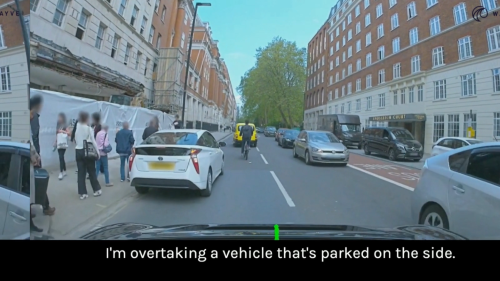Table of Contents
ToggleWayve's Technology:
In a significant stride towards enhancing the intelligence of its self-driving cars, Wayve, a pioneering startup in the autonomous vehicle sector, has adopted a cutting-edge approach. The company has begun employing chatbots to engage in dialogue with its vehicles, posing questions about their driving choices and receiving informative responses. This development marks a crucial step in the evolution of autonomous driving technology and holds the promise of making self-driving vehicles smarter and safer.

A Glimpse into How Wayve's Innovative Approach Works:
In a significant stride towards enhancing the intelligence of its self-At the heart of this innovation lies the utilization of the same technology that powers ChatGPT. Wayve has seamlessly integrated this powerful language model into its existing self-driving software. The result is a hybrid model that melds video data and driving data with natural-language descriptions. This fusion enables the system to comprehend and interpret what the vehicle perceives in its environment and how it responds to various situations.
The Significance of Wayve's Breakthrough:
Wayve is positioning this breakthrough as a pivotal advancement in the realm of AI safety. The process of “interrogating” self-driving software at every juncture of decision-making is a proactive measure aimed at gaining deeper insights into the rationale behind the car’s choices. This meticulous approach will not only provide a clearer understanding of why and how autonomous vehicles make specific decisions but also expedite the identification and rectification of any errors or anomalies.

Unveiling the Potential Benefits:
The integration of chatbots into the training process of self-driving cars opens up a realm of possibilities for the automotive industry and beyond. Here are some key benefits and implications:
Enhanced Safety:
By continually questioning and evaluating the AI driving system, Wayve aims to significantly improve the safety of autonomous vehicles. The ability to identify and address potential issues in real-time can prevent accidents and enhance passenger trust.
Efficient Training:
Chatbot-driven interactions facilitate a more efficient training process for self-driving cars. The incorporation of natural language descriptions allows the system to learn and adapt quickly to a wide range of driving scenarios.
Transparency and Accountability:
Wayve’s approach fosters transparency in autonomous decision-making. Understanding the thought process behind a self-driving car’s actions can be crucial for regulatory compliance and public acceptance.
Industry-Wide Impact:
If successful, Wayve’s methodology could set a new standard for training autonomous vehicles, potentially influencing other companies in the industry to adopt similar practices.
Conclusion: A Leap Forward in AI-Driven Transportation
Wayve’s integration of chatbots into its self-driving technology represents a significant leap forward in the field of AI-driven transportation. As the company continues to refine its approach and gather data from these interactive sessions with autonomous vehicles, we can expect to witness safer, more efficient, and more transparent self-driving experiences in the near future. This innovative use of AI and natural language processing is poised to redefine the landscape of autonomous transportation, ultimately benefiting society by making our roads safer and more efficient.
